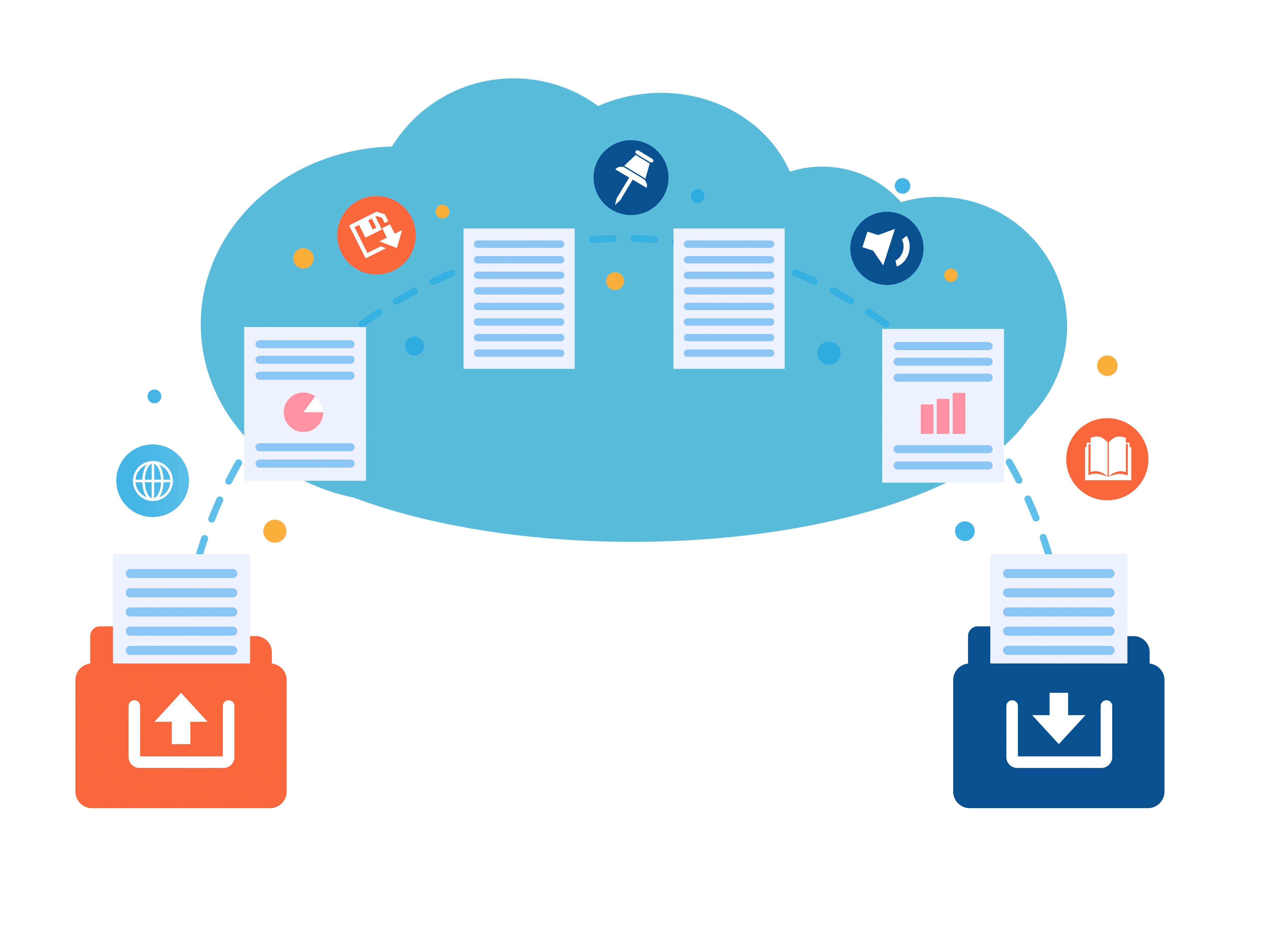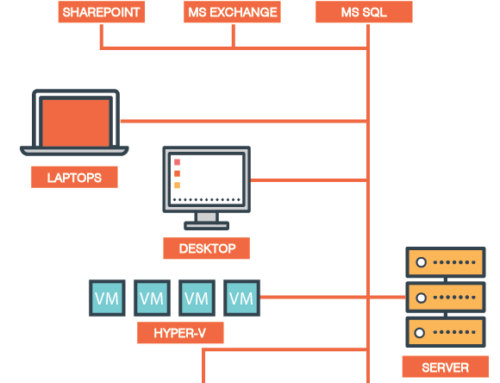Building a Hybrid Cloud Strategy for Your Business – A Guide

Are you in the process of digitally transforming your business? Are you considering the ways in which a cloud server and data storage service may be able to help grow your brand in the years to come? Now may be the time to consider moving to a hybrid cloud.
While hybrid cloud infrastructures may be considered something of a ‘buzzword’ in the here and now, statistics clearly show that, for unparalleled scalability and security in the remote working age, there may be no better solution for small to medium enterprises. As such, if your business is not yet working to a hybrid cloud strategy, you may be at risk of falling behind.
Let’s consider the hybrid cloud phenomenon in detail, and why it may be a solution that helps to enhance your productivity, efficiency, and data protection.
What is hybrid cloud?
Hybrid cloud, also known as multi-cloud or a combination of public and private clouds, is the practice of using different types of computing resources to provide services. It’s an umbrella term that describes how companies use multiple cloud providers for their IT infrastructure.
The idea behind hybrid cloud is to gain benefits from both public and private clouds while minimising risks associated with each type of cloud. Ultimately – to borrow a well-used phrase – it is the ‘best of both worlds’. But what are the pros and cons of public and private clouds – and why might it be worth moulding the two together?
What other types of cloud are there?
Hybrid clouds are largely seen as efficient amalgamations of public and private clouds.
What are public clouds?
A public cloud is a floating data service that operates on an off-site server or storage centre, allowing for business users to scale their applications and usage up and down as and when required. However, the public cloud model does not always offer users the same level of control and protection as private cloud infrastructures might.
Public clouds like Acronis tend to work well if there is high demand, and if there is likely to be complex scalability required. However, your data may be stored in multiple different places – and you don’t always have complete access or control to what remains in storage.
What are private clouds?
Private clouds, meanwhile, are largely hosted on-site. This means that the user has direct access to the infrastructure and thus has exclusive server space. In some cases, this service may be operated and managed by a third party, though it is not always the case.
Private cloud solutions are popular with businesses of all sizes as they can effectively assure some of the highest security standards over sensitive information. They also work well with regard to machine learning and artificial intelligence.
That said, private cloud adoption and installation can often be much more expensive than that of the public standard. In addition, private clouds are nowhere near as flexible or scalable – and you have to commit to a physical system that may well remain on-site.
Is hybrid cloud popular?
Yes – massively so! It’s thought that up to 94% of all enterprises are using some form of cloud service to support their daily running.
What’s more, it’s thought that four to five cloud platforms per business seems to be the norm – meaning that modern firms are concerning themselves more and more with ways to manage their data on the go.
How does a hybrid cloud system work in practice?
Ultimately, a hybrid cloud solution is one that is highly complex, yet remarkably efficient. Hybrid cloud infrastructures allow for free-flowing data, between multiple different cloud storage or server solutions. Crucially, a hybrid cloud system is one that can and will bring many different services together, without the risk of communication stalling, and without the flexibility concerns outlined within the private model.
Ensuring that a hybrid cloud model works well for your enterprise is a complex matter. This means that you will need to request the support of a hybrid cloud provisioning team – such as the experts at Datastore 365 – to fully analyse and implement a service that reflects your day to day demands and needs.
A common misconception is that a hybrid cloud is merely a public cloud and a private cloud working in tandem. Hybrids are much more complex – and what’s more, they actively communicate with each other.
How does a hybrid cloud connect up?
This is where matters can get a little more complex. There are several ways to connect your networks via the cloud, and most popularly, that is either achieved through a VPN, or Virtual Private Network, or via WAN, Wide Area Network.
VPN connectivity occurs entirely over the internet – meaning that your multiple clouds can communicate with each other, smoothly and efficiently, without the need for complex networking in-house. However, given that data connections can be at risk of varying speeds and stability, it stands to reason that some business owners prefer to operate on a WAN basis.
WAN tends to offer more stability, as connections are direct and reliable. In many cases, this solution can help smaller enterprises link their cloud demands together without having to worry about internet dropouts.
Beyond this, hybrid cloud solutions can be set up through public internet – though ultimately, you will need to consider the most cost-effective and efficient solution for your business’ needs in conversation with a cloud provider.
Why might I use hybrid cloud setup?
There are myriad reasons why hybrid cloud setups could help to solidify and protect your enterprise in the face of an ever-changing customer landscape:
It’s added agility…
Hybrid cloud resources can be made available to you at any time – and what’s more, you can choose which resources you need ad-hoc. This is incredible agility – there is no need to invest in expensive applications and hardware that may otherwise lose their usefulness in a short time.
Simple access cloud resources as and when you require them – helping you to keep up with customer demand as and when it changes.
It’s there when demand increases and decreases
Yes – hybrid cloud solutions can help you to scale up and down should your business’ demands increase. The same applies if it decreases, too. Capacity is simple to toggle and manage as and when required – should you notice traffic slowing back down again, it’s time to scale back.
It’s added security
The private aspect to hybrid cloud management means that you can effectively decide which resources receive the most security. Therefore, you can effectively decide to host less critical resources in the ‘public’ sector of the hybrid, keeping your most sensitive information and apps behind lock and key.
It saves space on-site
The scalable, off-site nature of hybrid cloud solutions can help you to save space and running costs on-site. Private cloud solutions and on-site data storage / server running can drive up both spatial footprint and power consumption. Therefore, with a hybrid cloud model, you are immediately driving down costs and saving space for additional hardware or resources.
Cloud backs you up
The best hybrid cloud solutions will also arrive with data backup as standard – meaning that no matter where you may be, should data loss or malicious attacks occur, you can replenish lost information within a matter of minutes. Not only that, but you can also be sure to bounce back from disasters without excessive downtime. Modern hybrid solutions are never held on one site alone, meaning if one server goes down, too, you can restore data and service within a matter of moments.
Security and Recovery With Cloud
Hybrid cloud security is famously robust, and this is largely thanks to its sophisticated, multi-faceted potential. Hybrid cloud infrastructures generally run through multiple physical setups to help ensure that you always have backup available.
On top of this, hybrid cloud systems make use of deep encryption, and a variety of tools that you can use to control and access your data from afar. Add in the element of an always-on data replenishment service through 24/7 backup, and you never have to worry about the security of your information in the cloud.
Considering your own hybrid operation
Of course, all of the above looks at hypotheticals. Your own hybrid operation is likely to be bespoke to your own customers’ demands, as well as those of your in-house team. Here are a few points you may wish to consider before adopting hybrid cloud:
- Do you wish to retain any legacy systems or services?
- Do you have a vision for how your hybrid cloud is to be set up?
- What is your long-term plan for hybrid cloud management – how can it help you to grow and scale your business?
- Have you accounted for costs – alongside the complexity of cloud setup you demand?
- Do your existing applications and services stand to work seamlessly with hybrid cloud scalability?
- Which business needs and demands do you need to prioritise the most?
Working with us will ensure that you have a hybrid cloud plan of action that can not only benefit your operation from the get-go, but which you can scale up and down at your leisure.
Considering Costs For Hybrid Cloud
Of course, you must also take the time to consider costs. There are a handful of elements to hybrid cloud scaling that will drive costs up and down – and as a provider, it’s our job to ensure that you receive the support and clarity you need from the get-go.
Factors that may impact on the overall running costs of your hybrid cloud may include:
- Application integrations
- Customisation and scaling
- Data transfers
- Data storage
- Licensing (software / hardware alike)
- Cloud management
- Compliance and regulatory checks
There is quite a bit to consider – and, as mentioned, we are here to help ensure your hybrid cloud is as adaptable as you need it to be. We’ll make sure to set up a flexible model that’s within your budget long-term, too.
Choose a cloud provider that’s right for you
At Datastore 365, we work with an array of leading cloud service providers and developers to ensure that you have access to the security, scalability and data reassurance you demand.
If you are considering a hybrid cloud setup but are unsure which route to take, please make sure to get in touch with us as soon as possible for a free consultation at your convenience.




